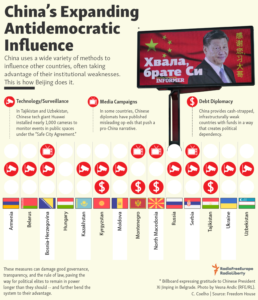
RFE/RL
Movements and regimes inspired by liberal ideals are increasingly finding themselves on the defensive in a world increasingly vulnerable to authoritarian mischief, notes analyst Brian Stewart. Although excessive centralization is not a winning strategy for states in building efficient economies and nimble responses to pandemics, China already has the economic and military means to bully its neighbors, intimidate private enterprises and undermine the liberal order, he writes for the Bulwark.
A pushback must be organized and new arrangements must be formed to halt and reverse this dire trend. A league of democracies, founded on the defense of open societies and the promotion of liberal values rather than national sovereignty, is central to this mission, he suggests.
 Are democracies or authoritarian states better equipped to deal with public health crises? the Asia Society Policy Institute asks. What are the specific vulnerabilities and advantages that different regime types have in dealing with pandemics? Are there other factors — from state capacity, to public trust in institutions, to the strength of health care systems – that better explain the variance in the efficacy of government responses globally? Which countries have handled the crisis best? And what lessons should policymakers glean from the coronavirus crisis thus far?
Are democracies or authoritarian states better equipped to deal with public health crises? the Asia Society Policy Institute asks. What are the specific vulnerabilities and advantages that different regime types have in dealing with pandemics? Are there other factors — from state capacity, to public trust in institutions, to the strength of health care systems – that better explain the variance in the efficacy of government responses globally? Which countries have handled the crisis best? And what lessons should policymakers glean from the coronavirus crisis thus far?
To answer these questions and analyze the strengths and weaknesses of government responses globally, the Asia Society Policy Institute (ASPI) hosts a discussion with renowned journalist, author, and political scientist Fareed Zakaria. ASPI President The Hon. Kevin Rudd will join Zakaria in conversation about the experience of democratic and authoritarian states under COVID-19. RSVP
All events will be live-streamed on YouTube and Facebook. For information about future events in this series and for ASPI’s additional coronavirus content see here.







